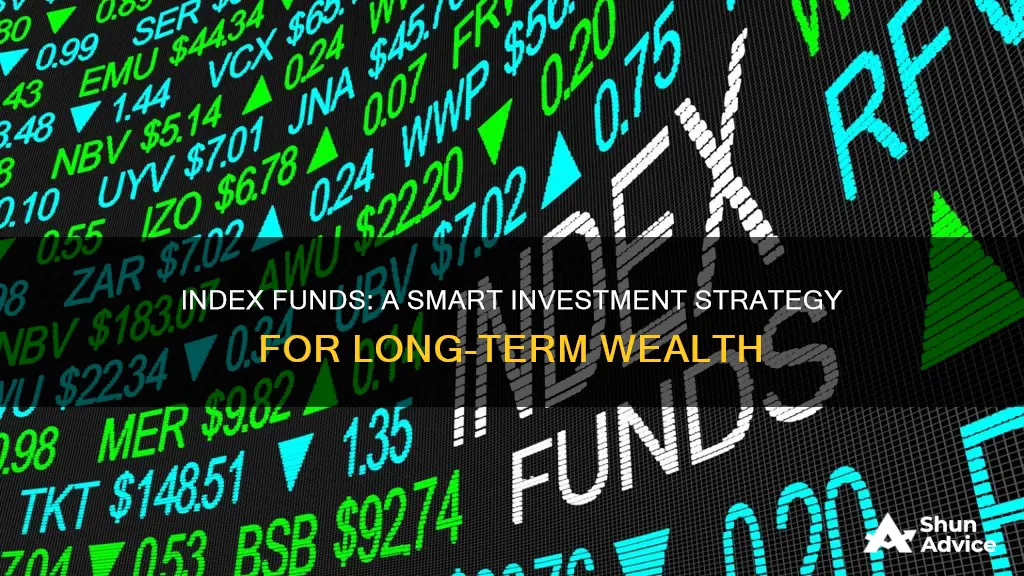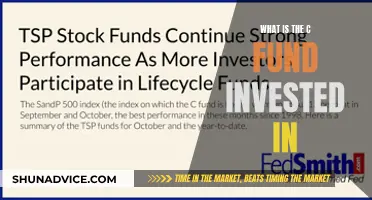
Index funds are a type of mutual fund or exchange-traded fund (ETF) that tracks the performance of a market index, such as the S&P 500. They are a passive investment strategy, meaning they don't require active management to decide which stocks to buy or sell. Index funds are designed to mirror the performance of the index they track, and they usually come with lower fees than actively managed funds. This makes them a popular choice for investors, especially those looking for a low-cost, long-term investment option.
| Characteristics | Values |
|---|---|
| Type of fund | Mutual fund or exchange-traded fund (ETF) |
| Investment type | Stocks or bonds |
| Investment aim | To mirror the performance of an index |
| Management | Passive |
| Risk | Lower than individual stocks |
| Returns | Average market returns |
| Fees | Low |
| Taxes | Low |
| Investor input | Low |
What You'll Learn

Index funds vs. actively managed funds
Index funds and actively managed funds are two types of mutual funds with different approaches to investing. Here is a detailed comparison of the two:
Investment Strategy
Index funds are passively managed funds that aim to mirror the performance of a specific market index, such as the S&P 500 or the Dow Jones Industrial Average. They do this by investing in all or a representative sample of the stocks or bonds in the index. Index funds are considered a passive investment strategy because they don't require active decision-making on which investments to buy or sell.
On the other hand, actively managed funds are actively managed by professional money managers who hand-pick investments with the goal of outperforming the market. These managers conduct in-depth research and use their expertise to select stocks or bonds that they believe will perform well.
Fees and Costs
Index funds generally have lower fees than actively managed funds. Since index funds are passively managed, they do not require a large number of analysts and stock pickers, resulting in lower expenses. Actively managed funds, on the other hand, tend to have higher fees because investors pay for the manager's expertise and active management of the fund.
Performance and Risk
While past performance does not guarantee future results, historical data shows that index funds have consistently outperformed actively managed funds over the long term. This is partly due to the lower fees associated with index funds, which can eat into investment returns.
In terms of risk, index funds are considered less risky than actively managed funds because they are highly diversified. By investing in a broad range of securities, index funds reduce the impact of any single investment on the overall portfolio. Actively managed funds, while actively managed, may be more vulnerable to market downturns and may underperform their benchmarks.
Suitability for Investors
Index funds are often recommended for investors seeking a long-term, passive investment strategy. They are suitable for investors who want to match the market performance without actively selecting stocks. Index funds are also attractive due to their low fees and tax efficiency.
Actively managed funds, on the other hand, may appeal to investors who believe that active management can outperform the market. These funds offer the potential for higher returns but also carry the risk of underperformance. Actively managed funds may be suitable for investors who want more control over their investments and are willing to pay higher fees for professional management.
Investing in Funds: Diversification, Expertise, and Access
You may want to see also

Pros of investing in index funds
Index funds are a great way to build wealth over time, and there are several pros to investing in them. Here are some of the advantages:
Low Costs and Fees
Index funds are passively managed, meaning they don't require active fund managers to pick and choose stocks. As a result, they have much lower management fees than actively managed funds. Index funds also tend to have lower transaction costs since they buy and sell securities less frequently. These lower costs can significantly impact your returns over time.
Tax Efficiency
Index funds are tax-efficient because they generate less taxable income than other investments. They buy and sell securities less frequently, resulting in lower capital gains taxes for their shareholders. Additionally, when index funds sell securities, they can choose from various lots to minimise the tax impact, further reducing the tax burden on investors.
Diversification and Reduced Risk
Index funds provide immediate diversification, allowing investors to own a wide range of stocks or bonds across different sectors and industries with a single purchase. This diversification helps to reduce the risk of significant losses, as the performance of the fund is not dependent on a small number of individual stocks.
Long-Term Performance and Ease of Investing
Index funds aim to mirror the performance of the market or a specific index, and over time, the market tends to rise. While there may be short-term fluctuations, holding index funds for the long term can provide solid returns. Additionally, investing in index funds is easy and accessible, especially for beginners, as they don't require extensive knowledge of financial markets.
Minimal Research and Maintenance
Index funds are passively managed, so investors don't need to spend time actively researching individual stocks or constantly monitoring their investments. The fund manager's primary role is to ensure the fund mirrors the chosen index, reducing the time and effort required by the investor.
Investing in Infrastructure: Building Tomorrow's Economy Today
You may want to see also

Cons of investing in index funds
Index funds are a popular investment choice due to their potential for stable long-term returns, diversification, and low fees. However, there are several cons to investing in index funds that you should consider:
Lack of Downside Protection
The stock market has historically been a profitable investment, but it has also experienced downturns. Investing in an index fund means that you will be exposed to the downside of the market. For example, if you invest in an index fund that tracks the S&P 500, you will benefit when the market is performing well, but you will also be vulnerable to losses when the market declines.
Lack of Reactive Ability
Index funds do not allow for proactive behaviour in response to market changes. If a stock becomes overvalued, it will carry more weight in the index, which is the opposite of what a knowledgeable investor would want to do. With an index fund, you cannot act on your knowledge of overvalued or undervalued stocks.
No Control Over Holdings
Index funds are set portfolios, and investors have no control over the individual holdings. You may have specific companies that you want to invest in or avoid for moral or personal reasons, but with an index fund, you cannot choose which companies to include or exclude from your portfolio.
Limited Exposure to Different Strategies
There are many successful investing strategies, but index funds may not give you access to these strategies. You may be able to achieve better risk-adjusted returns by combining different strategies, rather than simply investing in an index fund.
Dampened Personal Satisfaction
Investing can be stressful, and index funds may not alleviate this stress. You may still find yourself constantly checking the market's performance and worrying about the economic landscape. Additionally, you will not experience the satisfaction of making successful investments and seeing your money grow as a result of your own decisions.
Trust Fund Investment Strategies: Where to Begin?
You may want to see also

How to invest in index funds
Index funds are a passive investment strategy that can be a great way to build wealth over time. They are a low-cost, easy way to invest, and they often perform better than actively managed funds. Here is a step-by-step guide on how to invest in index funds:
- Have a goal: Know what you want to achieve with your investment. If you are looking for quick gains and are willing to take on more risk, index funds may not be the best option for you. Index funds are more suitable for long-term wealth accumulation, especially for retirement.
- Research index funds: Familiarize yourself with the different types of index funds available. They can vary based on company size and capitalization (small-, mid-, or large-cap indexes), geography, business sector, asset type, and market opportunities. You may only need to invest in one broad stock market index, as recommended by Warren Buffett, or you can customize your portfolio by mixing and matching different types of index funds.
- Choose an index: Select a specific index that you want to track, such as the S&P 500, Dow Jones Industrial Average, or Nasdaq Composite.
- Pick an index fund: Once you have chosen an index, find an index fund that closely tracks its performance and has the lowest costs. Consider factors such as investment and account minimums, expense ratios, and tax-cost ratios.
- Decide where to buy: You can purchase index funds directly from a mutual fund company or through a brokerage. Exchange-traded funds (ETFs) are also an option and can be traded throughout the day. Consider factors such as fund selection, convenience, trading costs, impact investing, and commission-free options when deciding where to buy.
- Buy index fund shares: Open an investment account, such as a brokerage account, individual retirement account (IRA), or Roth IRA, and purchase the index fund of your choice. You can select a fixed dollar amount or choose the number of shares you want to buy.
- Monitor your index funds: While index funds are passive investments, it is important to periodically check their performance. Ensure that your index fund is mirroring the underlying index's performance and review the fees to make sure they are not too high.
Dimensional Fund Investing: What Products Are Offered?
You may want to see also

Index funds and taxes
Index funds are a great investment option for building wealth over the long term. They are also popular with retirement investors. But what about the taxes?
Index funds are considered tax-efficient compared to other investments. This is because they don't trade in and out of securities as often as an active fund, which means they produce fewer taxable gains. When an index fund does sell a security, the fund manager can choose from hundreds or thousands of lots to sell the ones with the lowest tax implications.
However, as a shareholder in an index fund, you may still be taxed on gains even if you haven't sold any of your shares. This is because funds also buy and sell securities, and by law, they must pass on any net gains to shareholders at least once a year. This means you could owe taxes on gains made by the fund, even if your fund's share price went down during the year.
If you're investing in exchange-traded funds (ETFs), there are additional tax considerations. ETFs that hold dividend-paying stocks will distribute earnings to shareholders, usually annually, and these dividends are taxed at the ordinary income rate. If you sell an ETF, any gains will be taxed based on how long you owned it and your income. For ETFs held long-term, you'll pay long-term capital gains taxes, while short-term holdings will be taxed at the ordinary income rate.
Commodity ETFs, which invest in commodities like oil or gold, have their own set of tax rules. These ETFs are often structured as limited partnerships and are taxed using the 60/40 rule, where 60% of gains are taxed at the long-term rate and 40% at the short-term rate, regardless of how long you've held the investment.
Precious metals ETFs are treated as collectibles by the IRS, with a maximum long-term capital gains rate of 31.8%.
Ultimately, while index funds are considered tax-efficient, there are still tax implications to consider. Be sure to consult a tax or financial advisor about your individual situation.
Mutual Funds: US Market Investment Options for Indians
You may want to see also







